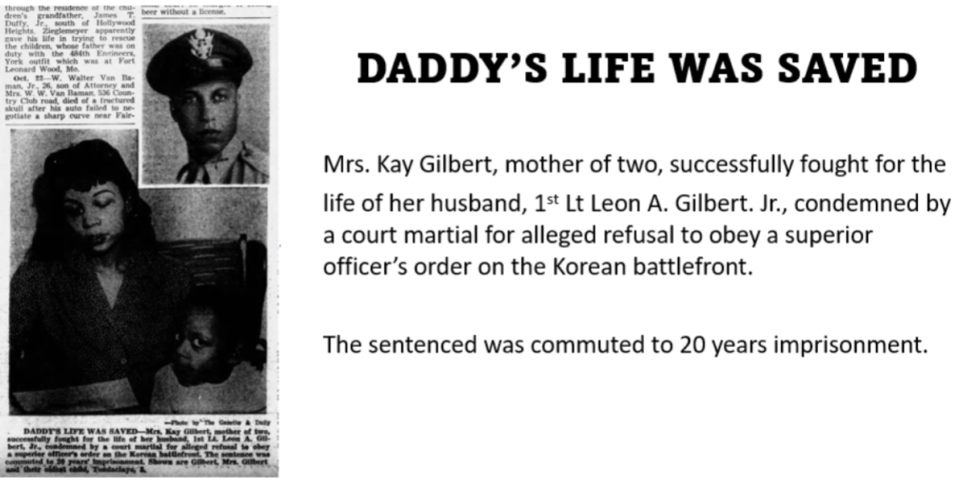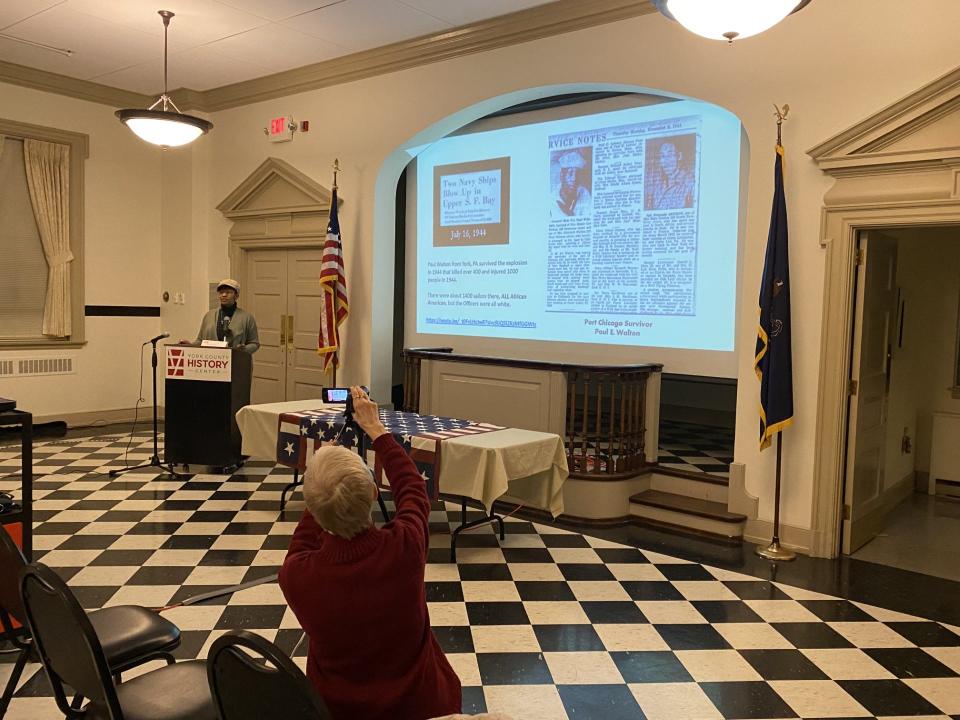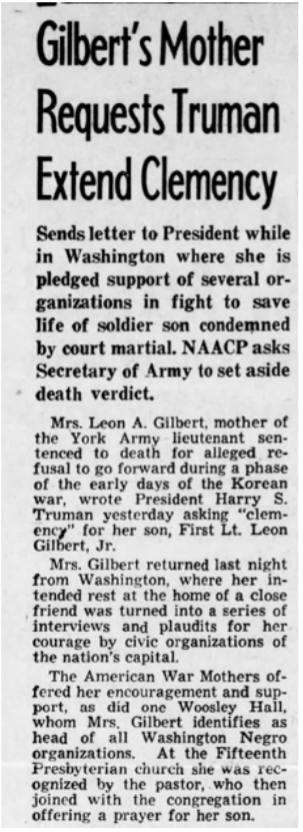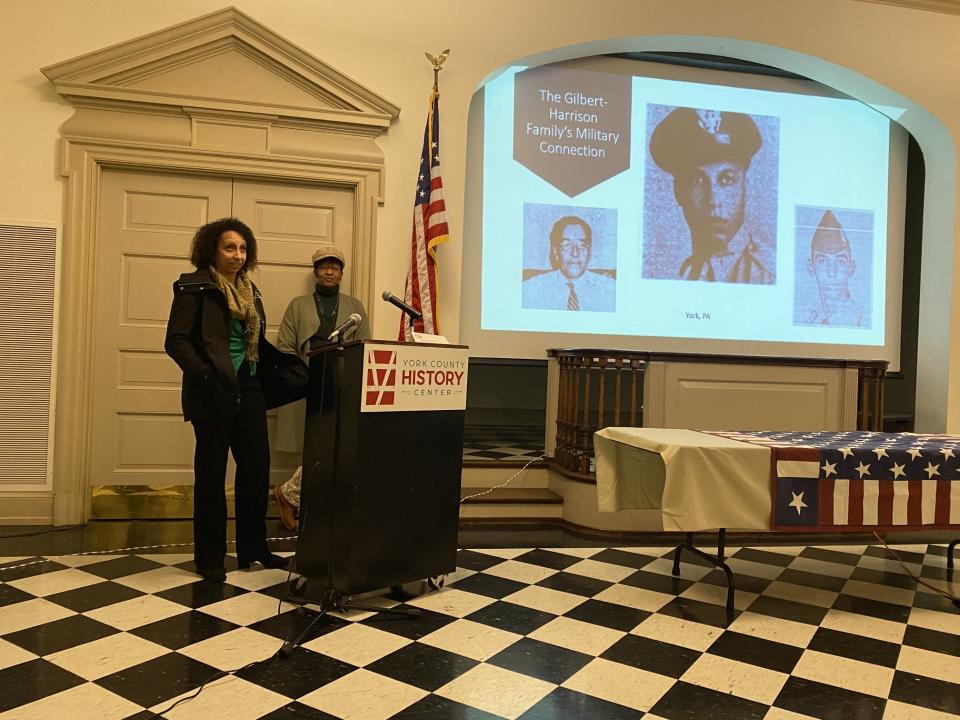Leon Gilbert Jr.’s dishonor inspired family members to honor him with military service
- Oops!Something went wrong.Please try again later.
At age 17, Albert A. Harrison Jr. entered the service in the mid-1960s with a mission already in mind.
He mustered in with the 82nd Airborne, operating out of Fort Bragg, North Carolina, and entered into combat in Vietnam.
He was wounded, recovered and fought again. He was wounded a second time, eventually leaving the military with four Purple Heart medals after two tours in Vietnam.
Harrison was not alone in his family wearing the uniform in those days. About eight cousins and family members from York County joined him in military service.

He and the others found motivation to join in an unpopular war. They served in honor of a family member who had been dishonored.
Lt. Leon A. Gilbert Jr., Harrison’s uncle, had been court-martialed and sentenced to death for, according to the military, refusing an order in the Korean War. Gilbert, a decorated combat veteran, believed the order would lead his unit to certain death.
This story of Leon Gilbert, Albert Harrison, and other family members was told as part of Samantha Dorm’s ALLVETS presentation at the York County History Center. Dorm, drawing from Friends of Lebanon Cemetery research, was joined by Leslie Harrison, Albert’s sister, in the presentation.
The Gilberts, a military family
The military story of Leon Gilbert starts with his father, Leon Gilbert Sr., who served in World War I.
He came home and worked for the U.S. Department of Agriculture. He lived to see his son in uniform in World War II and the Korean War and died and was laid to rest in Lebanon Cemetery.
Leon Gilbert Jr. followed his father in uniform, serving in a unit of Black soldiers in the segregated Army, a unit that fought with distinction against Axis troops on the Italian peninsula in World War II.
Gilbert remained in military service after the war, and when North Korea invaded South Korea in 1950, Lt. Gilbert’s all-Black 24th Infantry Regiment was deployed.
Those helter-skelter early days were difficult moments for the U.S. military. Many units performed poorly after North Korea’s surprise attack. Gilbert served under command of white officers in an Army that, after a 1948 order from President Harry Truman, was trying to field effective integrated units.

At one point under heavy mortar and machine gun fire, Gilbert received orders to attack an enemy position, a directive that the battle-hardened Gilbert later said he questioned.
He was arrested, court-martialed and then sentenced to death for allegedly refusing orders.
He stated his position in a 1950 New York Times story: “I did not refuse to obey the order. I was trying to explain why it couldn’t be carried out.” He had 12 men in his command, he said, and considered it his duty as an officer to show why the order meant certain death.
His family worked locally and nationally to elevate this rush to justice — or injustice — and the NAACP’s Thurgood Marshall soon stood behind Gilbert. Truman commuted the death sentence, and Gilbert served five years in prison.
In 1996, an official Army report noted that Gilbert's regiment performed poorly in the early years of the Korean conflict, as did many white units. But the report attributed the failures to neglect, inferior white leadership and institutional racism.
“There was no single reason for what happened (to the 24th),” the report stated. “An aggressive enemy, old and worn equipment, inexperience at all levels, leadership failures high and low, casualties among key personnel and a lack of bonding and cohesion in some units all played their part. There was no lack of courage among the officers and men.”
That explained the 24th’s performance, and some at the ALLVETS meeting wondered what could yet be done to officially restore Gilbert’s honor. Gilbert died in 1999, 25 years ago.

‘We know the facts’
Leon Gilbert Jr. served his prison time in California and later came home to York.
At one point, members of the 24th located him in York after a search.
“He didn’t know if we would accept him. We welcomed him with open arms,” Capt. Edward L. Grandy said in 1999. “No matter what was written, no matter what was said — we know the facts. We were there.”
Grandy made his comments at a memorial service for Gilbert after his death at age 78. Those attending the service filled three rooms of York’s Keffer Funeral Home.
At the memorial service, Albert Harrison reflected about his uncle and his own service in Vietnam.
“I once thought he was the biggest coward in the United States of America, and I told him that to his face,” Harrison said. “You know why? Because I didn’t know the man. He taught me so many things that helped me survive two tours in Vietnam. You don’t need a lot of medals to be a hero. He was my hero.”

‘Heavy on our hearts’
The military story about Leon Gilbert has been told in York County and must be retold as the generations pass. There are lasting lessons of racial segregation in the Army, ill-trained military commanders and scapegoating.
The story of three generations of Gilbert family’s military service, their reasons for serving and the downstream impact on the family must be remembered.
All this came forth in Leslie Harrison’s telling at the ALLVETS meeting.
“The story has been heavy on our hearts for a very long time,” Leslie, Albert Harrison’s sister, said.
She recalls a teacher talking inaccurately about her Uncle Leon in a York High class.
To straighten things out, her uncle fortunately could serve as a resource – a kind of show and tell.
She noted that Leon’s son, Leon Gilbert III, served and, in fact, was one of the eight family members, including her brother, Albert, who served in the Vietnam War. Albert felt he had to go, she said, and he enlisted at age 17. He received his high school diploma in Vietnam.
“His sacrifice became something that they had to follow through with,” she said about Leon Gilbert Jr., a hero to the family. “You know, because he gave up so much for them — to move forward.”
“His dishonor needed to be honored.”
Sources: Friends of Lebanon Cemetery research, YDR files, York Dispatch files, James McClure’s “Never to be Forgotten.”
Jim McClure is a retired editor of the York Daily Record and has authored or co-authored nine books on York County history. Reach him at jimmcclure21@outlook.com.
This article originally appeared on York Daily Record: York PA veteran Leon Gilbert Jr.'s 'dishonor needed to be honored’

